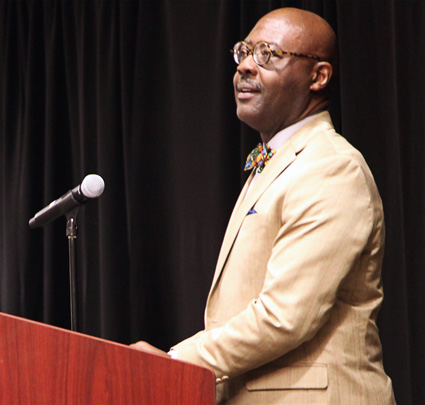By George Henson
Christianity in the West has been infiltrated by values and attitudes of race, challenging efforts to heal racial and social divisions and for Christians to experience authentic connections with Christ, an expert on faith and religion said in a recent lecture at Howard Payne University.
Willie James Jennings, associate professor of theology and black church studies at Duke University Divinity School, said that inhibits true Christian values such as embracing outsiders.
For real change to occur, Christians must exchange a counterfeit racial faith for a true faith in Jesus Christ, Jennings said. However, they must recognize how interwoven the two strains have become over centuries.
“Racial faith weaves itself inside our prayers, our worship, and our hopes and dreams as a people,” he said. “It is intensely a matter of faith, because it is tied to the way people see and want to be seen and their aspirations of who they might become in this world.”
The impact of this reality has been all too evident in American history and society, he added.
Americans often make the mistake of treating racism as a virus attacking the body, rather than recognizing it as “a constituting reality of our social body,” he said.
“The reason our racial struggles in this country and the West are so intractable, stubbornly yelling at us in the face year after year, is because we refuse to see how deeply their roots are embedded in the ways we think, live and imagine our world socially,” Jennings said.
One result has been the identification of race with religion in America.
“Race in America is a form of religious faith, and we will never be able to understand or address it with the necessary knowledge, energy or commitment until we comprehend its true religious architecture,” Jennings said.
Forgetting they were Gentiles
The problem emerged when Christians forgot they were Gentiles — people outside God’s covenant relationship with the Jews — he said, adding, they have overlooked the Christian journey of the outsider.
“We have forgotten what it means to see life from those on the outside who have been included by grace, and consequently, we have lost the sense of inclusion as a life calling and a way of life,” he said.
Much is lost in forgetting that value.
“This has affected the way we read the Bible, and because it has affected the way we read the Bible, it has deeply impacted the way we treat others.”
The dynamic has turned the faith into something that it was never meant to be.
“We imagine ourselves at the center and others at the margin,” Jennings said.
Racial ‘faith’ and European colonialism
Western Christians in the 21st century also need to recognize how racial faith grew out of European colonialism, Jennings said.
“It grew in those spaces where Christians from the Old World came to the New World and realized their unprecedented power over indigenous peoples and land. This was power like they had never seen or experienced. Such power deeply infected and influenced the way Christians looked out onto indigenous peoples,” he said.
Since European Christians considered themselves the “bearers of the faith,” it affected their interaction with the indigenous population, he said. They felt they were “destined by God to be the teachers of the world.”

While teaching is at the heart of Christianity, it ranks below “being a learner,” Jennings said.
“We are those who joined the story of another people, Israel, and in this way learned of our God. It is the joining another as learner that is central to our … authentic faith,” he said.
That value of learning was lost upon European Christians as they encountered the people of the New World.
“This missionary impulse of instruction is not a problem, but placed within a constellation of dominating effects like stealing the land, enslaving the native people, the destruction of their holy places and the wholesale killing of indigenous animals, all of these things helped to create the most insidious aspect of racial faith,” he said.
Natives were dismissed as pagans trapped in demonic influence or ignorance, and therefore in need of guidance.
“These settler Christians took a biblical framework, turned it upside down and inside out, and looked out onto their world in a terribly sick way,” Jennings said.
Jesus’ learning and teaching
This is not the example Jesus set, he said. Jesus became human to learn of humanity and engage in culture. After learning the culture, he then taught.
“His teaching is embedded in his learning. He has learned the wisdom of his people and from that well of wisdom, he teaches the way of God. We often bypass the reality of his shared wisdom, preferring to see his words falling only from heaven,” he said.
Because of this, Christians often miss the necessity of being a learner when making disciples, Jennings said.
“We have preferred to impose theological knowledge, denigrate the indigenous knowledge and present a God who knows everything and wants to know nothing,” he said.
